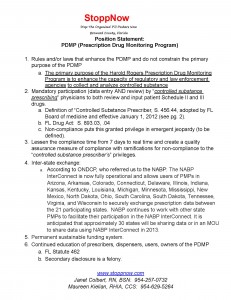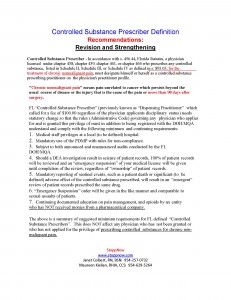Archives for : September2014
This is why FL became known and is known as the OxyExpress.
Mike Deeson, WTSP
http://www.wtsp.com/story/news/investigations/2014/09/12/problems-with-florida-board-of-medicine-disciplining-doctors/15531799/
St. Petersburg, Florida — It should come as no surprise the Florida Board of Medicine ranks as one of the worst in the country for disciplining doctors. Last year, 10 Investigates looked at the Board’s record and found it to be abysmal.
Related Story: Despite malpractice settlements, few docs lose licenses
During our investigation, 10 Investigates looked at how the Florida Board of Medicine appeared to be reluctant to discipline or pull a physician’s license even in the most egregious cases.
A prime example is Dr. Gunwant Dhaliwal who we first reported fondling patients’ breasts in 2007. Dhaliwal was first accused in 1999 of doing the same thing. Despite the fact several victims came forth and Dhaliwal was arrested, convicted, served time in jail, and was ordered to pay $800,000 in a civil lawsuit, the Board didn’t hear his case until last year. At that time, only one member of the Board, Dr. Jason Rosenberg argued that Dhaliwal should never be allowed to practice medicine in Florida again.
Rosenberg said at Dhaliwal’s hearing “He [Dhaliwal] was convicted of a crime we consider heinous we should revoke his license. Nothing else is acceptable.”
When he saw his fellow board members were reluctant, Rosenberg said, “What are we telling the citizens of Florida. Your doctor fondles your breasts, gets deprived of his liberty after his day in court and now we’re going to go back and let him practice. Wrong message!”
However, instead of stripping Dhaliwal of his license, the Board suspended him for six months, gave him a $10,000 fine and he is practicing once again in Pasco County under probation. The only restriction is that Dhaliwal must have a licensed female health practitioner chaperone him when he examines a female patient, and the female practitioner has to document she was there in the patient’s records. Otherwise, it’s business as usual for Dr. Dhaliwal and that’s fine with the Board.

Last year, 10 Investigates looked at the Florida Board of Medicine’s record disciplining doctors and found it to be abysmal. WTSP
This is the root of the problem. You can not have a pain clinic without a physician.
http://www.wtsp.com/story/news/health/2014/09/12/despite-multiple-malpractice-payouts-doctors-often-keep-practicing/15530643/
Ben Eisler and Mark Strassmann, CBS News
(CBS News) Dr. James Dunphy met his wife Susie in college. They went to medical school together, got married and had two sons. On a family trip to Florida in 2009, Dr. Susie Dunphy was diagnosed with appendicitis. She had emergency surgery; two days later the 42-year-old bled to death in her hospital bed.
James Dunphy said the hardest part was breaking the news to his two young boys.
“I told them it would be okay, and that I would be their mom and dad now,” Dunphy said.
In the weeks after her death, Dunphy reviewed his wife’s medical file. What he read convinced him that her doctor could have prevented her death. He said his wife’s blood pressure had been critically low for hours after the surgery. But no lab tests or imaging studies were ordered to see what was wrong.
“These are the kind of vitals that anybody with basic training can recognize as abnormal,” Dunphy told CBS News.
Dunphy sued his wife’s surgeon for failing to adequately monitor her after the procedure, blaming him in part for her death.
The surgeon, Dr. Ernest Rehnke of St. Petersburg, denied wrongdoing. But he settled the case for $250,000 – the maximum his insurance policy would pay for a single claim.
A review of Florida records by CBS News found Rehnke has had 11 medical malpractice lawsuit payouts since 2000 – tying him for the most of any practicing physician in Florida. Yet the Florida Board of Medicine, which is responsible for stopping dangerous doctors from practicing, has never restricted his license.

CBS News investigates effectiveness of state medical boards at stopping dangerous physicians. CBS News
CBS News then looked at the 25 doctors with the most malpractice payouts in Florida. CBS News found just four of them lost their licenses – and three of those four only lost them after they had been arrested and charged with either drug trafficking or billing fraud. The fourth lost his license after he failed to comply with the terms of a lesser punishment. In other words, not a single one of them had been stopped from practicing solely for providing poor medical care.
A malpractice payout can come as a result of a judgment or a settlement – though most come from settlements.
Dr. Sidney Wolfe of the watchdog group Public Citizen said the findings show the Florida Board of Medicine is not doing its job.
“When you look at these doctors with the largest number of malpractice suits, you have to ask the question — at what point could we have prevented the last five, or the last ten?” he told CBS News.
Wolfe said it’s a problem found not just in Florida. He has published studies on state medical boards nationwide. He said many of them are failing to protect patients. His latest report found that from 1990 to 2009, more than half the doctors in the U.S. who had their privileges restricted or revoked by a hospital had never even been fined by their state medical board. He said hospitals generally only go after the most dangerous physicians.
Public Citizen has also ranked medical boards based on the number of actions taken per physician in their state. Those with the most: Ohio, Oklahoma and Alaska. Those with the least: South Carolina, Minnesota, Wisconsin and Florida.
About a year after Susie Dunphy’s death, her husband received a letter in the mail from the Florida Board of Medicine. It said the agency had investigated his wife’s case and found no basis to file a complaint against Rehnke.
“I thought it was unbelievable,” Dunphy said. “I teach medical students. This is something so basic I would expect my medical students to recognize this is not normal…It makes me wonder if they even reviewed the case.”
The Florida Board of Medicine declined CBS News’ repeated requests for an interview. Last month CBS News even went to the agency’s public meeting in Orlando, but no one would agree to talk with CBS News. In a statement, a spokesperson wrote, “[we] must follow the due process of law in order to ensure the rights and entitlements of all parties to any action…The department is diligent in its efforts to ensure the public is protected from unsafe or unscrupulous health care practice.”
Rehnke also would not give CBS News an interview or even a statement.
Elected officials in each state have oversight over their medical boards. In Florida, State Senator Jeremy Ring, chairman of the Government Oversight Committee, said that as a result of our reporting, he will introduce legislation to improve the board’s ability to protect patients.
You can look up malpractice payouts made on behalf of Florida doctors here.




